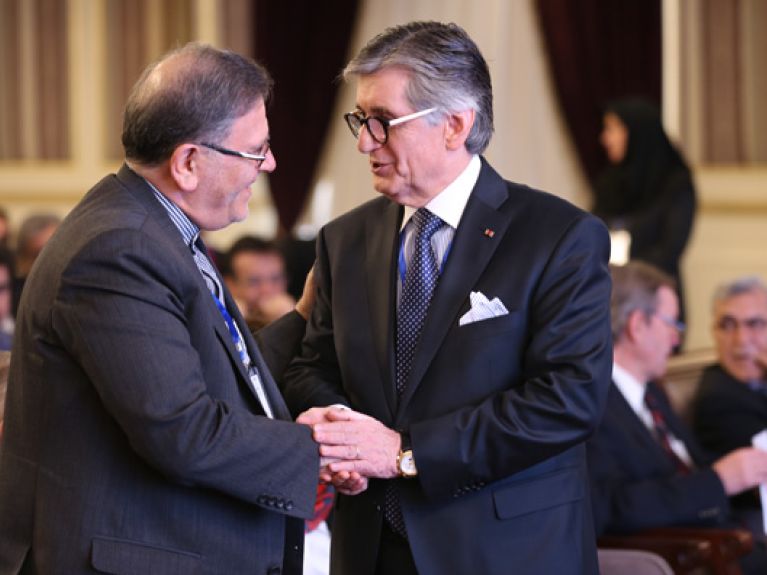“There is very great interest”
The easing of sanctions against Iran has given rise to new possibilities for bilateral cooperation. Frankfurt event manager Nader Maleki talks about the challenges and opportunities for the economy, banks and tourism.

For 30 years, Frankfurt-based event manager Dr Nader Maleki has been organizing high-level congresses and events for the financial sector. In March 2016 he initiated the first international banking conference in Teheran after sanctions against the country were eased. The conference now takes place twice a year, alternating between Teheran and Frankfurt am Main. Maleki, who was awarded the Cross of the Order of Merit of the Federal Republic of Germany for services rendered to Frankfurt as a financial hub, talks in our interview about business with his homeland Iran, about opportunities and investments, and about travelling to Iran with a suitcase full of money.
Mr Maleki, back in the 1970s you were already staging rock concerts at the German Club in Teheran. Ever since sanctions against Iran were eased, you have been bringing German and Iranian entrepreneurs together at conferences and organizing trips for delegations. What has changed?
I left Iran 50 years ago to study abroad. I never imagined that I would one day open a conference there attended by half the Iranian government. When I staged a conference with German business representatives in Iran in 2015 – the first to be organized by someone from abroad – I was treated like a star for three whole days. I was interviewed on television and had my picture on the covers of newspapers and magazines. The level of interest in the German economy is huge.
As a result of the international sanctions, the Iranian economy was long cut off from the western world. What does Iran now need most of all?
Everything. The country really needs to catch up in terms of mechanical engineering, its fleet of aircraft is said to be really outdated, and there is a huge market for car manufacturing. The Iranians do not want simply to import products, however – they are interested in direct investment in their country, that is to say they would prefer to have a car factory built there. Having said that, the French were somewhat quicker off the mark than the Germans in that respect. But there is very great interest in German products.
It sounds like an Eldorado for German business.
Unfortunately, German banks are still very reluctant to grant loans for business in Iran. In the past, some of them were forced to pay large penalties in the United States because they had supposedly violated the sanctions. This deters many banks even to this day. What is more, as yet it is still not all that easy to transfer large sums of money to Iran because the country is not properly linked to the international payment system. In other words, anyone wishing to invest in Iran has to take money with them in their suitcase. I have often made such trips myself. In the V.I.P. room where you have to officially declare how much cash you are carrying with you, I once saw three other passengers open their large suitcases at the counter, saying that they contained 14 million. Later I saw them with their suitcases again out in the street. The regulations are changing quickly at the moment, however.
Is it difficult to do business in Iran?
Getting there is certainly very straightforward, as Lufthansa operates daily flights to Teheran. You can set off at 5 pm on a Friday and be back in Frankfurt at 6 am on Monday morning. Saturday and Sunday are work days in Iran, so you can get a lot done at the weekend. And if you are only travelling with hand luggage, it takes just five minutes to get from the plane to a taxi – I once timed myself.
And then? Let’s say a German businessman meets with an Iranian – how easy is it to inadvertently cause offence?
The Iranians are very hospitable. You quickly find yourself on first name terms, just as soon as you have got to know one another a little. Men greet each other with three kisses – left, right, left – which Westerners often find a little unusual. When you meet a woman, you greet her with a nod of the head, and do not touch her.
What opportunities does Iran offer?
Iran has a very young population, with an average age of under 27. Most are very well educated. When I was a boy, I went to a German school, while my brother went to an Iranian one. A lot more importance was attached to maths at the Iranian school, and that is still the case today. Many also speak very good English. Given its great history and beautiful nature, tourism could be huge in Iran – just think of Isfahan, for example! However, studies show that up to 500 new hotels would be needed to get tourism moving there. The Chinese have already bought up and modernized many old hotels, and some look wonderful now.
Interview: Tim Kanning
German Iranians with a passion for start-ups
The “Iranian Modernity” cultural programme
© www.deutschland.de

